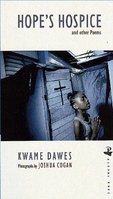Book Review: Hauntingly poignant, but instructive
Published: Sunday | June 14, 2009

Title: Hope's Hospice and Other Poems
Author: Kwame Dawes
Photographer: Joshua Cogan
Publisher: Peepal Tree
Reviewer: Paul H. Williams
If you don't have HIV/AIDS, and are rather nonchalant about acquiring it, then Hope's Hospice, with its sublime, but powerful messages, conceived and crafted by Kwame Dawes, will jolt you from your slumber and spur you to think, to act. Without being preachy, the lines are reflective/contemplative by their nature, but didactic for all intents and purposes.
'Hope's Hospice', the title poem, is the metaphor for Hope Hospice, one of the places where people with AIDS in Jamaica stay. In that hospice, there is much hope, but there are also pain, tears and suffering. From his visit to Hope, he writes: "The bodies of the dying/shuffling past, eyes still hoping/the van waiting in the shade/to take me from all this/the long ride through rain and dark/to Kingston, to sleep and more sleep." Dawes was disturbed.
The ability of AIDS to take the most macho of men down to his knees comes out in 'Nichol': "The way you made tender/the toughness of hard men/who would soon wash you/feed you with oily fingers/full of mashed ackee/and tomatoes/who would hold you against the night, men, tough/as teeth, hard men."
But Nichol was not done, for in 'Live Up', which was written 'For Nichol', there is: "You might call me cripple/but this cripple can walk/How it had me/all I wanted to do/was crawl in a ball/and dead like that/but see me here now/see me here now/man must live, iyah/man must live."
The embarrassing state of dependency that AIDS can cause the affected is told in 'Making Ends Meet': "Ever since she test positive/nothing won't go right/for her; it come in like a curse to blight her day/Big woman like this/depends on her mother for clothes money/for some dollars to buy panty - what a life!"
fear of dying
The fear of dying is so much a part of having AIDS, and the effects on the mind and body are devastating. The horrible things that some sufferers go through are exposed in 'Fear'. "The fourteen-year-old cough/the night sweats, the flight of lovers/the swelling brain - we say it is faith/like a mustard seed to believe this/What we won't say is that we don't know/and we won't know for certain until/the ravaging is upon us, and all fat is consumed/and our checks collapse, and our skins curdle/with sores, and our lungs grown thick/with blood and phlegm ... "
Other themes broached are deception, catharsis, false hope, vengeance, raping of innocence, and homophobia. 'Yap' tells the tale of hatred and man's inhumanity to man. "Nunez, the short Syrian, was the bait/with his tight pants and benign smile - securing this heterosexual credentials/despite his lisp and delicate eyes/And they lured Yap into the toilet/where he thought he'd find a friend/They beat his head till blood/washed the wet cement floor/and his blue shirt turned purple."
Dawes' imageries are enhanced by eight coloured photographs, including the one on the cover, by Joshua Cogan. The one on page 11 of a silhouette of a man sitting on a bed in a modest room and a young woman standing in the light at the door is quite poignant. So, too, is the one on page 42 in a red dress standing akimbo in the middle of a dark waiting room. On page 49, a man is at a door with a cross on it. A hand is at his left cheek and his eyes seem to be closed in meditation.
The 64-page collection of 23 poems (written in 2007) came from an "assignment for the Virginia Quarterly Review to report on the impact of HIV/AIDS on Jamaica", and sponsored by the Pulitzer Center on Crisis Reporting.
Apparently, Dawes was moved by the experience, and being a man of words, he had to put his thoughts on paper. And the idea of sugar-coating them never dawned on him. He's blunt and honest to himself. Not a sop he is. He's just human, shaken by what the scourge of AIDS is doing to humankind.
